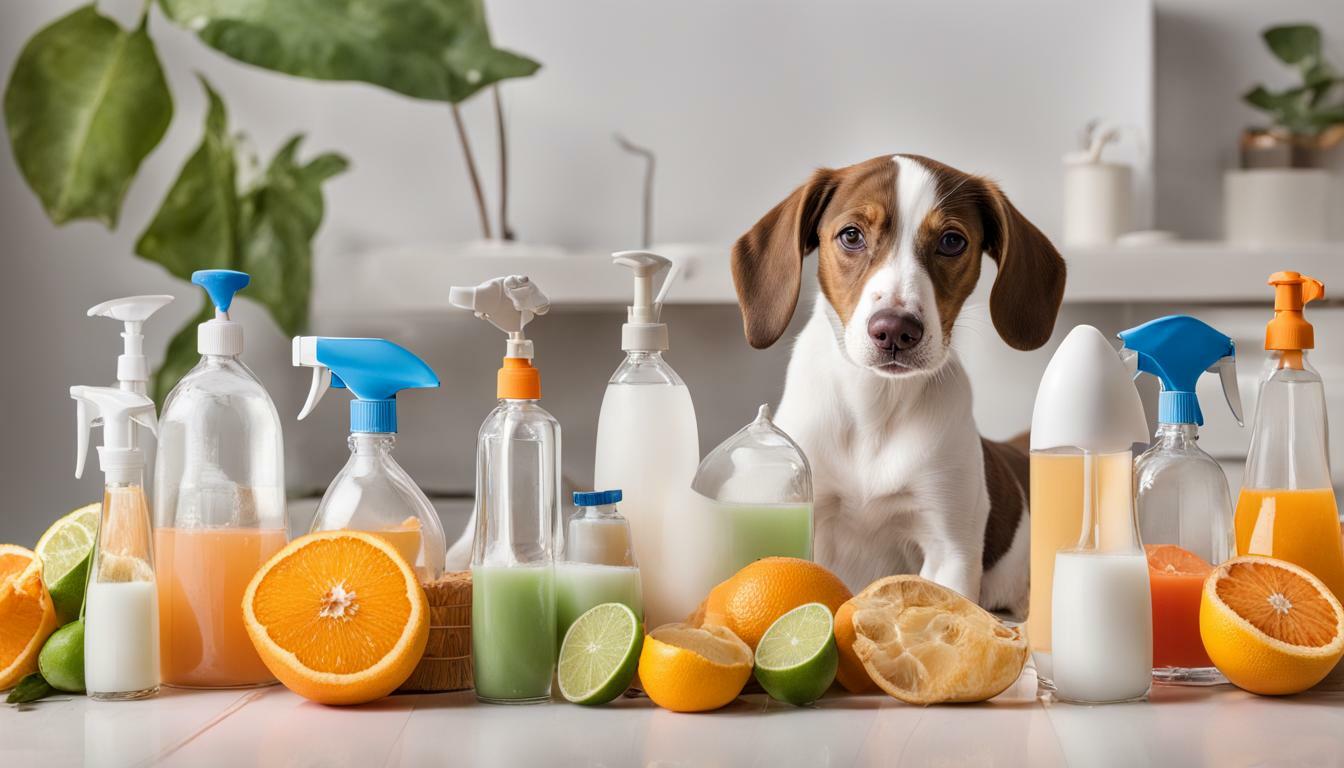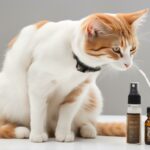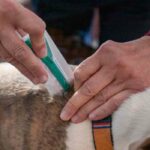
As a pet owner, it’s crucial to find safe ant killer solutions that won’t harm your furry friends. Many ant control methods on the market today contain toxic ingredients that can be harmful to your pets if ingested or if they come into contact with them. Therefore, it’s essential to choose a pet-friendly ant killer that is non-toxic and safe for cats and dogs.
Fortunately, there are many effective ant killer products that pose no threat to your pets. These non-toxic ant killers are formulated with natural ingredients that are safe for pets. By choosing these options, you can rid your home of an ant infestation without putting your pets at risk.
Key Takeaways:
- It’s crucial for pet owners to find safe ant killer solutions
- Toxic ant control methods can be harmful to pets if ingested or if they come into contact with them
- Pet-friendly ant killers that are non-toxic and safe for cats and dogs are readily available
Understanding the Risks of Toxic Ant Killers
As a pet owner, it’s essential to be aware of the potential dangers of using toxic ant killers around pets. These products may contain harmful ingredients that can pose a risk to your furry friends.
Toxic ant baits and chemical ant extermination methods can be particularly hazardous to pets. They often contain ingredients like borax, which can cause vomiting, diarrhea, and other gastrointestinal issues in cats and dogs. Ingesting large amounts of borax can even be fatal to pets.
Other common harmful ingredients found in ant killers include pyrethroids and organophosphates. These chemicals can cause symptoms such as muscle tremors, seizures, and respiratory issues in pets.
It’s crucial to avoid using toxic ant killers in areas where pets frequent, such as the kitchen or living room. Even if the product claims to be safe for pets, it’s best to err on the side of caution and choose non-toxic alternatives.
Pet-Friendly Ant Control Methods
When dealing with an ant infestation in a home with pets, it is crucial to choose safe and non-toxic ant control methods. Fortunately, there are several effective pet-friendly ant control solutions that can help keep ants at bay without harming cats and dogs. The following are some natural and organic ant control methods:
Natural Ant Repellents for Pets
Vinegar and lemon juice are natural ant repellents that are safe for pets. These acidic substances disrupt ants’ scent trails, making it difficult for them to navigate. Simply mix equal parts of water and vinegar or lemon juice and spray around ant-infested areas. This will help repel ants and discourage them from coming back.
Pet-Safe Ant Traps
When it comes to ant traps, avoid using toxic ones that contain pesticides harmful to pets. Instead, opt for pet-safe ant traps such as borax-based ant traps. These traps work by attracting ants with a sugary bait laced with borax, a non-toxic mineral that kills ants but is harmless to pets when used in small quantities.
Organic Ant Control
Organic ant control is a non-toxic solution to an ant infestation. Diatomaceous earth is a popular organic ant control method that works by dehydrating ants’ exoskeletons, leading to their death. Sprinkle diatomaceous earth around ant-infested areas, and it will act as a barrier, preventing ants from crossing the treated area.
Essential Oils for Ant Infestations
Essential oils such as peppermint, cinnamon, and tea tree oil are known to repel ants without harming pets. Simply mix a few drops of essential oil with water in a spray bottle and spray around ant-infested areas. You can also use cotton balls soaked in essential oils and place them around ant entry points, such as windows and doors.
By using these natural, pet-friendly ant control methods, you can safely and effectively keep ants away from your beloved pets, creating a safe and comfortable environment for them.
Preventive Measures to Keep Ants Away from Pets
As a responsible pet owner, it’s important to take preventive measures to keep ants away from your pets. Here are some tips to prevent ants without harming your furry friends:
- Seal all food containers. Ants are attracted to food and can easily access it if it’s not properly sealed. Make sure all pet food containers are tightly closed to prevent ant infestations.
- Clean your pet’s eating area. Regularly clean your pet’s eating area to remove any food crumbs or spills. This will help to deter ants from being attracted to the area.
- Use pet-friendly ant deterrents. There are several ant deterrents that are safe for pets, including cinnamon, peppermint, and coffee grounds. Sprinkle these deterrents around your pet’s eating area or other areas where ants are present.
- Keep ants out of pet food. Ants can crawl into pet food containers and contaminate the food. Use an ant-proof pet food bowl or place the food container in a shallow dish of water to create a barrier that ants cannot cross.
By implementing these preventive measures, you can significantly reduce the risk of ant infestations around your pets while keeping them safe from harmful ant killers.
Consulting with a Veterinarian
As a professional copywriting journalist, I highly recommend consulting with a veterinarian for expert guidance on ant control. It is essential to seek professional advice when dealing with ant infestations around pets to ensure their safety and well-being. Veterinarians can provide pet-safe ant killer recommendations and offer professional guidance on how to effectively address ant problems without harming pets.
By seeking veterinary advice on ant control, pet owners can gain peace of mind and confidence in their ant control methods. Veterinarians have a wealth of knowledge and experience in dealing with pests around pets and can provide pet-specific recommendations tailored to each pet’s individual needs.
In addition to recommending pet-safe ant killer products, veterinarians can also advise on preventive measures to keep ants away from pets. They can offer tips on ant prevention that do not pose any harm to pets, such as using pet-friendly ant deterrents, sealing food containers, and keeping ants out of pet food areas.
Pet-Friendly Ant Control Methods
When it comes to controlling ants around pets, it is essential to prioritize their safety. As discussed in the previous sections, toxic ant killers can be harmful to pets, making it necessary to explore pet-friendly solutions. In this section, I will introduce natural and organic ant control methods that are safe for pets.
Natural Ant Repellents for Pets
Natural ant repellents, such as vinegar and lemon juice, are effective in keeping ants away without harming pets. Vinegar can be used to wipe down surfaces where ants are present, while lemon juice can be squeezed around entry points to deter them from entering. The strong scent of these natural ingredients is known to repel ants.
Pet-Safe Ant Traps
Ant traps are a popular solution for eliminating ants, but pet owners must be cautious when using them. Look for ant traps that are specifically labeled as pet-safe and avoid placing them in areas where pets can access them. Ant traps containing boric acid can be harmful to pets if ingested, so proper placement is crucial.
Organic Ant Control
Organic ant control products, such as diatomaceous earth and orange oil, are made from natural ingredients and are safe for pets. Diatomaceous earth is a fine powder that can be sprinkled around ant-infested areas to dehydrate and kill them. Orange oil contains d-limonene, a natural insecticide that is effective in controlling ant infestations.
Essential Oils for Ant Infestations
Essential oils, such as peppermint and tea tree oil, are known to repel ants without causing harm to pets. These oils can be mixed with water and sprayed around entry points to deter ants. However, essential oils can be toxic if ingested in large quantities, so it is important to use them in moderation and store them safely away from pets.
By using natural and organic ant control methods, pet owners can effectively address ant problems without putting their pets at risk. However, it is essential to keep in mind that preventive measures are also necessary to maintain a safe environment for pets.
FAQ
Q: What ant killer is safe for pets?
A: There are several pet-friendly ant killers available. Look for non-toxic options specifically formulated to be harmless to cats and dogs.
Q: What are the risks of using toxic ant killers around pets?
A: Toxic ant killers can be harmful to pets if ingested or if they come into contact with their skin. Common harmful ingredients found in ant killers can pose health risks to animals.
Q: Are there pet-friendly ant control methods?
A: Yes, there are pet-friendly ant control methods available. Natural ant repellents like vinegar and lemon juice can be effective. Pet-safe ant traps and organic ant control options are also great alternatives. Essential oils known to repel ants without harming pets are recommended as well.
Q: How can I prevent ants without harming my pets?
A: There are preventive measures you can take to keep ants away from your pets. Sealing food containers, using pet-friendly ant deterrents, and keeping ants out of pet food areas are all effective ways to prevent ants without posing any harm to your pets.
Q: Should I consult with a veterinarian for ant control advice?
A: Yes, it is advisable to consult with a veterinarian for expert guidance on ant control, especially when dealing with ant infestations around pets. Veterinarians can recommend pet-safe ant killer products and provide professional guidance.
Conclusion
In conclusion, finding a safe ant killer for pets is crucial for pet owners. By choosing pet-friendly ant control methods, understanding the risks of toxic ant killers, implementing preventive measures, and seeking professional advice when needed, you can effectively manage ant problems while prioritizing the safety of your pets.
- Does Flea Treatment Kill Lice? - September 8, 2023
- Does Flea Treatment Kill Mites? - September 8, 2023
- How to Put Flea Treatment on a Dog? - September 8, 2023






